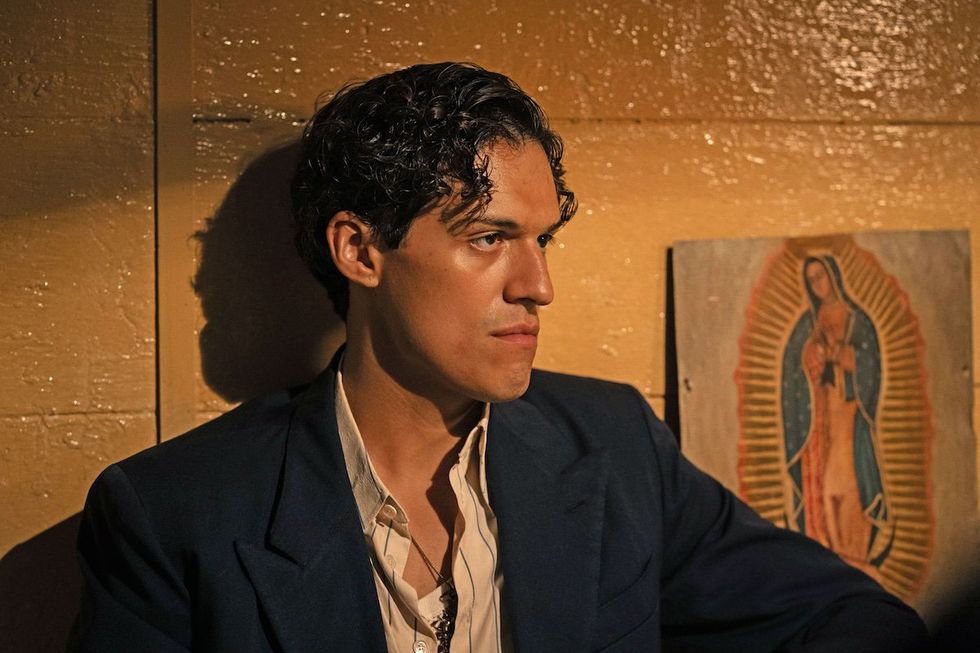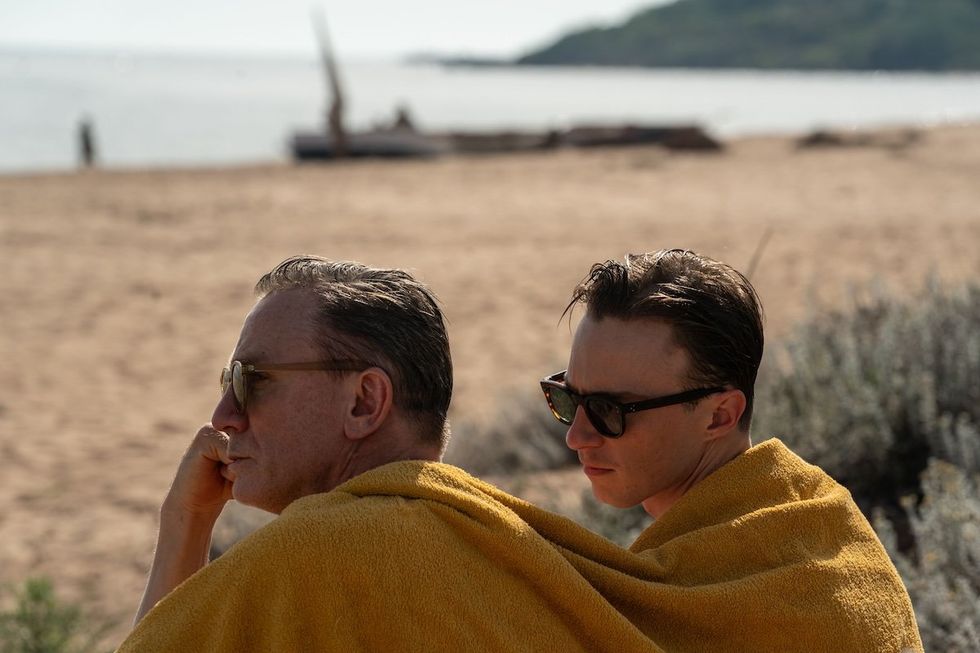“You think he’s queer?” Daniel Craig’s William S. Burroughs surrogate Lee asks his friend Joe about Drew Starkey’s lithe young Eugene in Queer.
Keep up with the latest in LGBTQ+ news and politics. Sign up for The Advocate's email newsletter.
“You could always just ask,” Joe, Jason Schwartzman’s louche invocation of Allen Ginsberg, replies while Lee protests that he could never. Set in Mexico City in the ’50s, Luca Guadagnino's adaptation of Burroughs’s novella delivers the audience to a time when "queer" was a slur used by those who identified with it. And something so straightforward as asking someone if they were anything but straight was not done in the light of day.
Throughout Queer, Lee, an addict and expat, smolders and sweats through his linen suit jackets while cruising Mexico City’s gay underworld, becoming smitten with and hooking up with pretty young things, including Omar Apollo’s character, billed only as Chimu bar guy.
Told in several sections, Queer follows the tenuous relationship of Lee and Eugene from Mexico City to the jungles of Ecuador, where they trip on yagé or ayahuasca together, before finally landing on Lee back in Mexico.
 A24
A24
The film drops at a time in the United States when the re-ascension of Donald Trump to the presidency has some LGBTQ+ folks, again targets under Project 2025, considering expat status. Though unlike when Burroughs wrote Queer while awaiting trial for killing his wife in a botched game of William Tell, queer sex is discussed more openly and mostly free of pathos among LGBTQ+ people nowadays.
“Burroughs was a very complicated, messy, kind of wonderful artist writer and who was married and went through all sorts of [experiences], was a junkie, and represented queerness at a time when it was illegal, when it was all of these things,” Craig, who plays the queer character Benoit Blanc in Knives Out, tells The Advocate. “I think it is as important now as it ever was and maybe more so to have stories like this, but I wouldn't have tackled it unless I thought I could emotionally dig into it and know what that was.”
Starkey (Outer Banks) explains Eugene’s hot and cold approach to physical and emotional intimacy with Lee.
“I think he’s in a state of vulnerability. I think Lee's probably the first person in his life that’s ever shown [Eugene] to himself in a way. And I think that's scary, but also it’s in a time where he may not have, or a lot of people, you don't have the language to associate these feelings to externalize them in any way,” Starkey says.
“[Eugene] doesn't have the mechanisms to allow himself to show [intimacy], but there’s still some type of gravitational force that's pulling him towards Lee in a way. And at times he leans into it. At times, he keeps it at arm's length.”
 Daniel Craig as Lee and Drew Starkey as Eugene in Luca Guadagnino's Queer A24
Daniel Craig as Lee and Drew Starkey as Eugene in Luca Guadagnino's Queer A24
Though Apollo appears only briefly in the film, the image of his Chimu Bar Guy bedding Lee in a grimy hotel under stark overhead lighting permeates the movie. Queer recording artist Apollo, who says he’s a longtime fan of Burroughs, discusses working on that memorable scene with Craig that depicted real sexual connection between men.
“I got the call and [they] told me about the scene and how explicit it was. I instantly just said yes. I was like, Yeah, of course. It’s Daniel Craig. Of course I'm down,” Apollo says. “I wasn't really fearful or anything. I was like, It's kind of my reality. It’s not something that's new to me,” he adds.
“But it was exciting to do something, especially when it comes to skin and bodily physical contact, It’s nice to trust somebody that shoots those kinds of scenes, so intimate and beautifully. So I trusted everyone on set and it was really easy and fun.”
Watch The Advocate's interviews with Craig and Starkey and Apollo above.
Read out sibling publication Out's review of Queer here.


 A24
A24 
 Daniel Craig as Lee and Drew Starkey as Eugene in Luca Guadagnino's Queer A24
Daniel Craig as Lee and Drew Starkey as Eugene in Luca Guadagnino's Queer A24


































































Charlie Kirk DID say stoning gay people was the 'perfect law' — and these other heinous quotes